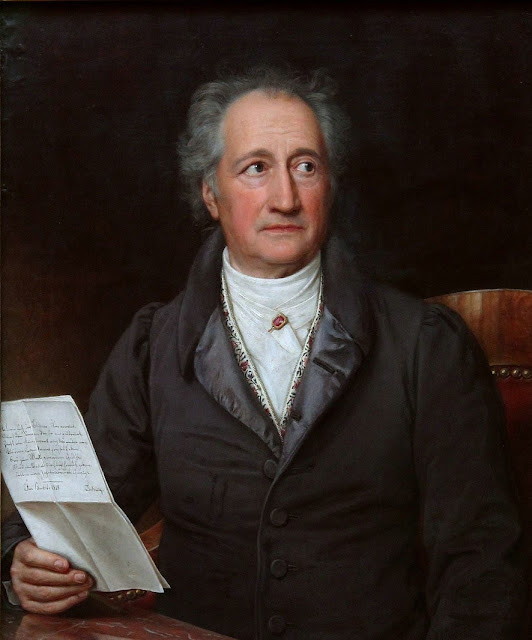 |
| Johann Wolfgang von Goethe by Joseph Karl Stieler |
THE warder looks down at the mid hour of night,
On the tombs that lie scatter'd below:
The moon fills the place with her silvery light,
And the churchyard like day seems to glow.
When see! first one grave, then another opes wide,
And women and men stepping forth are descried,
In cerements snow-white and trailing.
In haste for the sport soon their ankles they twitch,
And whirl round in dances so gay;
The young and the old, and the poor, and the rich,
But the cerements stand in their way;
And as modesty cannot avail them aught here,
They shake themselves all, and the shrouds soon appear
Scatter'd over the tombs in confusion.
Now waggles the leg, and now wriggles the thigh,
As the troop with strange gestures advance,
And a rattle and clatter anon rises high,
As of one beating time to the dance.
The sight to the warder seems wondrously queer,
When the villainous Tempter speaks thus in his ear:
"Seize one of the shrouds that lie yonder!"
Quick as thought it was done! and for safety he fled
Behind the church-door with all speed;
The moon still continues her clear light to shed
On the dance that they fearfully lead.
But the dancers at length disappear one by one,
And their shrouds, ere they vanish, they carefully don,
And under the turf all is quiet.
But one of them stumbles and shuffles there still,
And gropes at the graves in despair;
Yet 'tis by no comrade he's treated so ill
The shroud he soon scents in the air.
So he rattles the door—for the warder 'tis well
That 'tis bless'd, and so able the foe to repel,
All cover'd with crosses in metal.
The shroud he must have, and no rest will allow,
There remains for reflection no time;
On the ornaments Gothic the wight seizes now,
And from point on to point hastes to climb.
Alas for the warder! his doom is decreed!
Like a long-legged spider, with ne'er-changing speed,
Advances the dreaded pursuer.
The warder he quakes, and the warder turns pale,
The shroud to restore fain had sought;
When the end,—now can nothing to save him avail,—
In a tooth formed of iron is caught.
With vanishing lustre the moon's race is run,
When the bell thunders loudly a powerful One,
And the skeleton fails, crush'd to atoms.

No comments:
Post a Comment